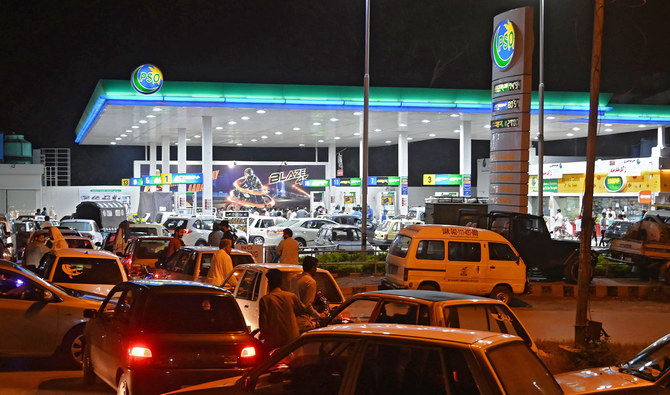KARACHI: Pakistan on Saturday defended its whopping, unscheduled price hike of petroleum products a day after the rate surge, and said the new price of oil remained lower than tariffs in neighboring countries like India and Bangladesh.
The Pakistan government on Friday increased the price of petroleum products by between 27 percent to 66 percent. This translated into petrol tariffs raised overnight by Rs25.58 per liter and diesel rates increased by Rs21.31 per liter, according to a notification issued by the finance division.
“The prices in Pakistan are lowest in the region despite the recent increase. The price of petrol has increased by 112% over the last 46 days in the international market,” Omar Ayub Khan, Federal Minister for Power and Petroleum, said on Saturday in the National Assembly, and added the government had still not passed on the full burden of the international price increase.
But Friday’s move was unusual and came unprompted by any summary moved by the oil sector regulator, OGRA. Under normal procedure, OGRA recommends new rates in a summary to the government at the end of every month. This time, the rates were increased on the recommendation of the petroleum division.
Nadeem Babar, Special Assistant to the Prime Minister on petroleum, said the prices had been announced five days ahead of time to reduce losses incurred by oil market companies who were importing at higher costs and selling at lower rates.
Petroleum sector analysts agreed and said the government’s decision to increase prices before the expected time will work solely to decrease oil company losses.
“The oil market companies are incurring huge losses and the government’s move to raise price has just mitigated the losses,” Dr. Nazar Abbas Zaidi, former Secretary of the Oil Companies Advisory Council (OCAC) told Arab News on Saturday.
On Thursday, Prime Minister Imran Khan ordered action against nine oil market companies for hoarding and black marketing. Action against them included directions to cancel licenses and the arrest of officials after an inquiry body, the fuel crisis committee, found them involved in deliberately creating petrol shortages in the country by hoarding fuel despite having excess stock.
But no FIR has so far been filed against any of the companies, the Islamabad High Court was told on Friday.
Since March 1, 2020, Pakistan reduced the price of petroleum products four times due to the international market price crash. But oil market companies failed to meet supply.
Experts generally agree Friday’s drastic price hike has been taken to address these ongoing supply disruptions, with the shortages caused in large part due to a pricing dispute between the government and the industry.
Meanwhile, opposition lawmakers criticized the government for the record price increase, and said there was no transparency or communication among members of the energy committee.
“There is no transparency in the government’s dealings. The developments are not shared with the members of the committee,” Mian Riaz Hussain Pirzada, a member of the National Assembly’s standing committee on energy told Arab News on Saturday, regarding the hasty price surge.
Last week, in a letter to the government, the OCAC said the four public listed refineries in the country had incurred a combined loss of Rs47 billion for fiscal year 2018-19 and fiscal year July 2019-March 2020. It said oil market companies had suffered foreign exchange losses in the range of Rs40 to 50 billion in a little over two years.
The PM’s special assistant on petroleum said on Saturday the government was taking steps to make amendments in the law to ensure a smooth supply of the fuel across the country going forward.
Pakistan defends whopping petroleum price hike as 'lowest in region'
https://arab.news/gpfsd
Pakistan defends whopping petroleum price hike as 'lowest in region'

- No transparency or communication among members of the energy committee, says opposition lawmaker
- On Thursday, PM Khan ordered action against nine oil market companies accused of hoarding and black marketing
Pakistan Cricket Board inducts Inzamam-ul-Haq, Saeed Anwar and others in its Hall of Fame

- Inzamam was a member of Pakistan’s 1992 World Cup-winning team, while Misbah was part of the ICC Men’s T20 World Cup 2009 winning squad
- Mushtaq captained the team to first-ever Test win in Australia in 1977, while Anwar scored 194 against India to break Viv Richards’ record
ISLAMABAD: The Pakistan Cricket Board (PCB) has inducted former cricket greats Inzamam-ul-Haq, Misbah-ul-Haq, Mushtaq Mohammad and Saeed Anwar in its Hall of Fame, who join the likes of Abdul Qadir, AH Kardar, Fazal Mahmood, Imran Khan, Wasim Akram and Zaheer Abbas in the illustrious group.
Inzamam played international cricket from 1991 to 2007 and was a member of Pakistan’s 1992 World Cup-winning team, while Misbah, who represented Pakistan from 2001 to 2017, was part of the ICC Men’s T20 World Cup 2009 winning squad and guided the team to the No.1 spot in the ICC Test Team Rankings in 2016.
Mushtaq played for Pakistan from 1959 to 1979 and captained the team to its first-ever Test win in Australia in 1977, featured in inaugural ICC Men’s Cricket World Cup 1975 in England before coaching the Pakistan side to the ICC Men’s Cricket World Cup 1999 final – also in England. Saeed Anwar represented Pakistan from 1989 to 2003, amassing a total of 31 centuries and 68 half-centuries, including three centuries and three half-centuries across the 1996, 1999 and 2003 World Cups.
The four icons of the game were inducted following a voting process, which was participated in by Akram, Zaheer, former Pakistan captain Azhar Ali, former Pakistani women cricketers Bismah Maroof and Nain Abidi, and journalists Majid Bhatti, Mohi Shah, Mohammad Yaqoob, Nauman Niaz, Sawera Pasha and Zahid Maqsood.
“On behalf of the Pakistan Cricket Board, I extend heartfelt congratulations to these four cricketing legends on their well-deserved inductions into the PCB Hall of Fame,” PCB Chairman Mohsin Naqvi said in a statement.
“This honor represents a tribute to their outstanding contributions to Pakistan cricket and to the global game.”
The four stalwarts will be formally inducted into the PCB Hall of Fame during the course of the year when they will be presented with commemorative caps and specially-designed plaques, according to the PCB.
Inzamam said he was “deeply honored” to be inducted into the PCB Hall of Fame.
“My journey as a professional cricketer, representing Pakistan on the world stage for nearly 16 years,” he said in comments shared by the PCB.
“I owe immense gratitude to my fellow cricketers, dedicated support staff and my family, without whom this journey would not have been possible. Representing Pakistan during an era with such high-caliber players was a privilege and their influence played a vital role in my growth and development as a batter.”
In his statement, Misbah said that representing Pakistan was an “absolute privilege” and this recognition by the Pakistan Cricket Board served as the “perfect crowning achievement” of his journey.
“Being acknowledged by your parent organization, alongside the appreciation of cricketing experts and fellow players is both gratifying and fulfilling,” he said.
“It is a testament to the dedication, relentless effort and sacrifices that went into meeting the highest standards of international cricket and translating those preparations into memorable performances.”
Mushtaq said that to be honored and recognized 45 years after playing his last match for Pakistan was “truly humbling” for him.
“Being part of the Pakistan cricket team during its formative years was both exciting and rewarding,” he said. “I feel privileged to have played alongside and against some of the most outstanding cricketers and thorough gentlemen, who played hard while always upholding the true spirit of the game.”
Anwar, who struck three successive ODI centuries in Sharjah and scored 194 against India in Chennai to break Viv Richards’ long-standing record for the highest individual score in ODIs, said he was “deeply grateful” to the panel for inducting him into the PCB Hall of Fame.
“My journey had its challenges, but it was a privilege to face them head-on. Each match I played for Pakistan holds a special place in my heart, though missing out on the ICC Cricket World Cup 1992 remains a regret,” he said.
“This journey, filled with triumphs and lessons, wouldn’t have been complete without the overwhelming support of our fans and the camaraderie of my teammates.”
Pakistan to open today two-day summit on girls’ education in Muslim countries

- The conference’s aim is to stress Islam’s message that both men, women have right to education
- Over 150 dignitaries from 44 Muslim and other friendly states are taking part in the conference
ISLAMABAD: Pakistan will open today, Saturday, a two-day summit on girls’ education in Muslim communities, with over 150 dignitaries from 44 Muslim and other friendly states taking part in the conference.
The global summit, hosted by the Pakistani education ministry, aims to address the challenges and opportunities in advancing girls’ education across Muslim communities worldwide, according to Pakistan’s foreign office.
Prime Minister Shehbaz Sharif will inaugurate the conference and deliver a keynote address at the opening session. He will reaffirm the nation’s commitment to promoting girls’ education and gender equality.
Education Minister Khalid Maqbool Siddiqui this week said the primary aim of the conference is to stress the implementation of the Islamic message, which clearly states that both men and women have the right to education.
“By promoting girls’ education, we can build better homes, a better society and a stronger nation,” he said at a media briefing, adding that an “Islamabad Declaration” will be announced at the end of the summit that would outline decisive steps to transform girls’ education in Islamic countries.
Several dignitaries, including Organization of Islamic Cooperation (OIC) Secretary-General Hissein Brahim Taha and Egyptian Grand Mufti Dr. Nazir Mohamed Ayad, have arrived in Pakistan to attend the summit.
Pakistan has also extended an invitation to Afghanistan to join representatives from other Islamic countries and attend the conference in Islamabad.
“We have extended an invitation to Afghanistan to participate in this conference and hope that their delegation will attend as it is a very important neighboring country,” Siddiqui said.
Since the Taliban’s return to power in 2021, at least 1.4 million Afghan girls have been denied access to secondary education, according to a report by the United Nations International Children’s Emergency Fund (UNICEF) released in August last year.
Siddiqui said everyone respects tribal customs and cultures, but all such practices must align with Islamic values in Muslim countries, adding that nothing holds precedence over them.
“In Islam, there is no justification for restricting women’s education,” he added.
‘Education apartheid’: schooling in crisis in Pakistan

- Pakistan is facing severe education crisis, with over 26 million children out of school, the majority in rural areas
- Poverty is the biggest factor keeping children out of classrooms, but the problem is worsened by other factors too
ABDULLAH GOTH: Aneesa Haroon drops off her tattered school bag at her rural home in Pakistan and hurriedly grabs lunch before joining her father in the fields to pick vegetables.
The 11-year-old’s entry into school at the age of seven was a negotiation between teachers and her parents in her farming village on the outskirts of Karachi.
“Initially, many parents were not in favor of educating their children,” headteacher Rukhsar Amna told AFP.
“Some children were working in the fields, and their income was considered more valuable than education.”
Pakistan is facing a severe education crisis, with more than 26 million children out of school, the majority in rural areas, according to official government figures — one of the highest rates in the world.
This weekend, Pakistan will host a two-day international summit to advocate for girls’ education in Muslim countries, attended by Nobel Peace laureate and education activist Malala Yousafzai.
In Pakistan, poverty is the biggest factor keeping children out of classrooms, but the problem is worsened by inadequate infrastructure and underqualified teachers, cultural barriers and the impacts of climate change-fueled extreme weather.
In the village of Abdullah Goth on the outskirts of Karachi, the non-profit Roshan Pakistan Foundation school is the first in decades to cater to the population of over 2,500 people.
“There was no school here for generations. This is the first time parents, the community and children have realized the importance of a school,” said Humaira Bachal, a 36-year-old education advocate from the public and privately funded foundation.
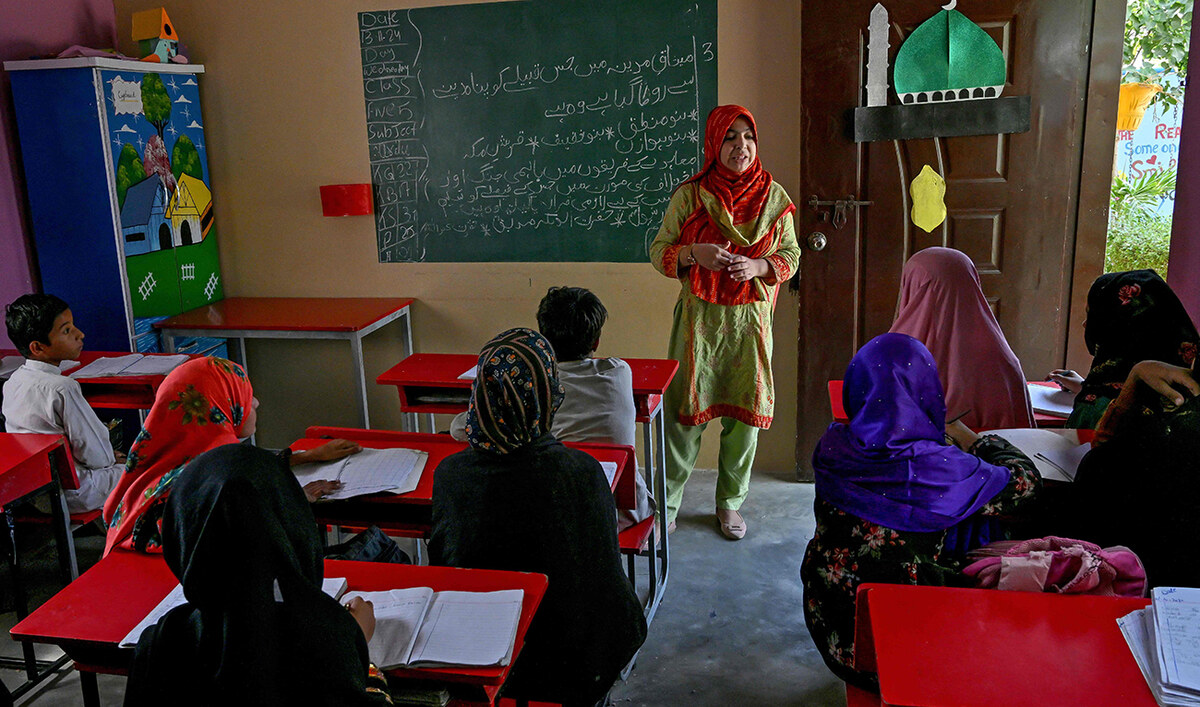
Still, the presence of a school was just the first hurdle, she added.
Families only agreed to send their children in exchange for food rations, to compensate for the loss of household income that the children contributed.
In Abdullah Goth, most children attend school in the morning, leaving them free to work in the afternoon.
“Their regular support is essential for us,” said Aneesa’s father, Haroon Baloch, as he watched his daughter and niece pick okra to sell at the market.
“People in our village keep goats, and the children help graze them while we are at work. After finishing grazing, they also assist us with labor tasks.”
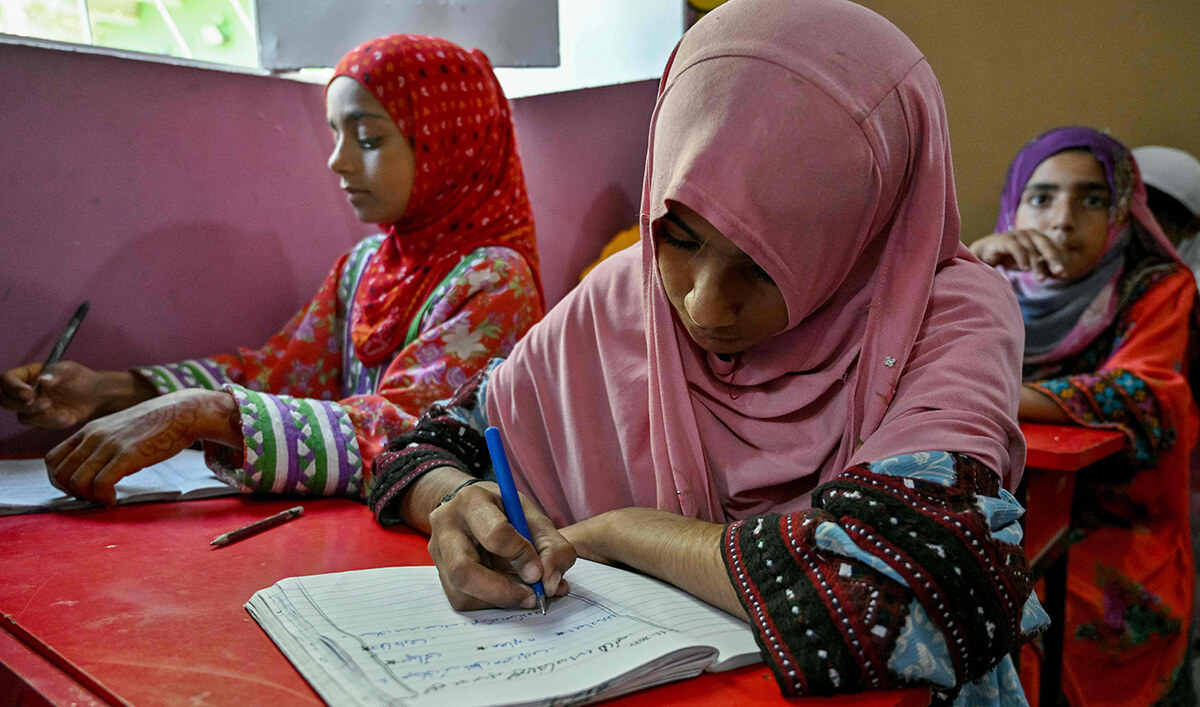
Education in Pakistan is also increasingly impacted by climate change.
Frequent school closures are announced due to heavy smog, heatwaves and floods, and government schools are rarely equipped with heating or fans.
In the restive provinces of Balochistan and Khyber Pakhtunkhwa, education faces significant setbacks due to ongoing militancy, while classes are routinely disrupted in the capital Islamabad due to political chaos.
Although the percentage of out-of-school children aged between five and 16 dropped from 44 percent in 2016 to 36 percent in 2023, according to census data, the absolute number rises each year as the population grows.
Girls all across the country are less likely to go to school, but in the poorest province of Balochistan, half of girls are out of school, according to the Pak Alliance for Maths and Science, which analyzed government data.
Cash-strapped Pakistan’s Prime Minister Shehbaz Sharif declared an “education emergency” last year, and said he would increase the education budget from 1.7 percent of GDP to 4 percent over the next five years.
Public schools funded by the government offer free education but struggle with limited resources and overcrowding, creating a huge market for private schools whose costs can start from a few dollars a month.
In a parallel system, thousands of madrassas provide Islamic education to children from the poorest families, as well as free meals and housing, but often fail to prepare students for the modern world.
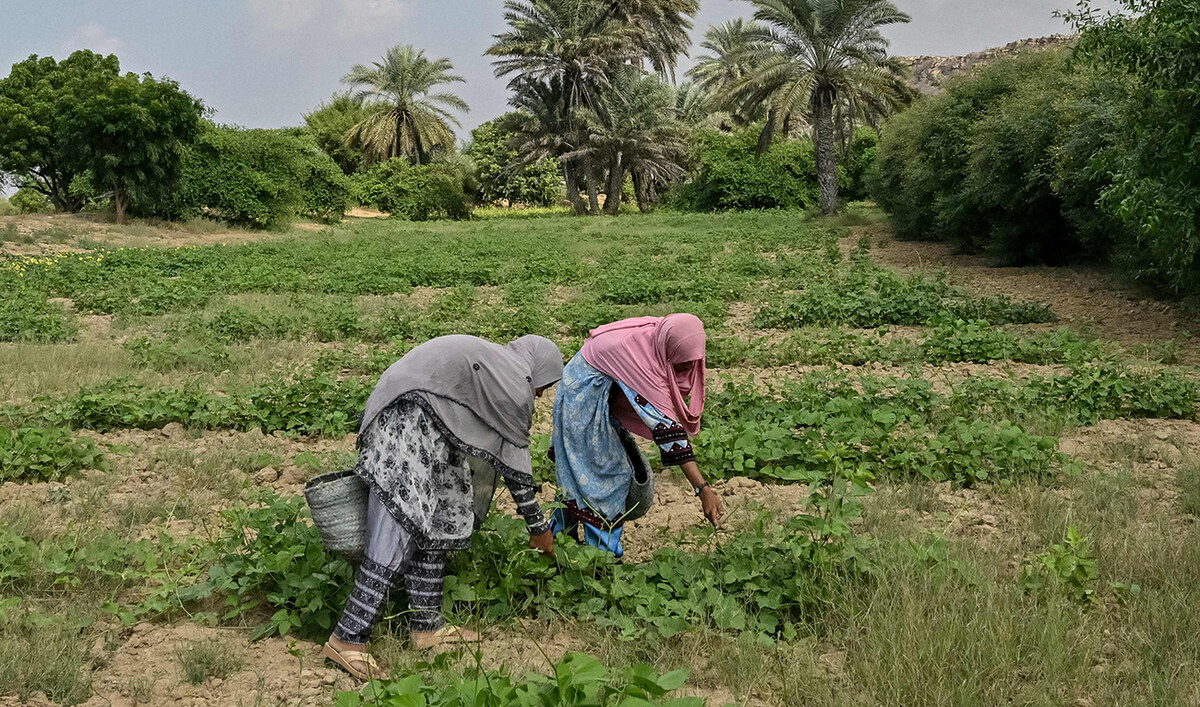
“In a way, we are experiencing an education apartheid,” said Adil Najam, an international relations professor at Boston University who has researched Pakistan’s education system.
“We have at least 10 different systems, and you can buy whatever quality of education you want, from absolutely abysmal to absolutely world-class.
“The private non-profit schools can prime the pump by putting (out) a good idea, but we are a country of a quarter billion, so these schools can’t change the system.”
Even young student Aneesa, who has set her mind on becoming a doctor after health professionals visited her school, recognizes the divide with city kids.
“They don’t work in field labor like we do.”
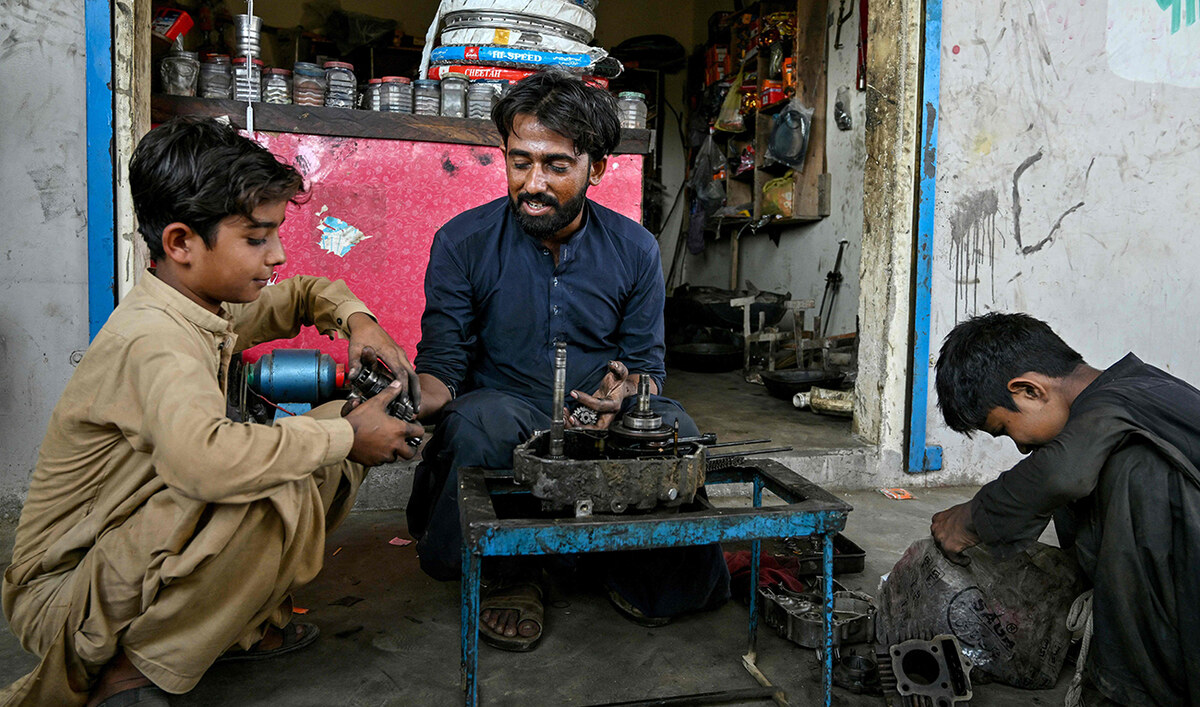
In the small market of Abdullah Goth, dozens of children can be seen ducking in and out of street-side cafes serving truck drivers or stacking fruit in market stalls.
Ten-year-old Kamran Imran supports his father in raising his three younger siblings by working at a motorcycle workshop in the afternoons, earning 250 rupees ($0.90) a day.
Muhammad Hanif, the 24-year-old owner of the workshop, does not support the idea of education and has not sent his own children to school.
“What’s the point of studying if after 10 to 12 years, we still end up struggling for basic needs, wasting time and finding no way out?” he told AFP.
Najam, the professor, said that low-quality education was contributing to the rise in out-of-school children.
Parents, realizing their children cannot compete for jobs with those who attended better schools, instead prefer to teach them labor skills.
“As big a crisis as children being out of school is the quality of the education in schools,” said Najam.
Rights network criticizes flood compensation and rehabilitation efforts in Sindh

- Network’s fact-finding team says not much consultation was done while designing houses for flood-hit families
- It says these one-room ‘flood-resilient’ structures lack basic amenities like toilets, can’t withstand heavy rain
KARACHI: A fact-finding mission conducted by a network of rights activists in South Asia on Friday criticized Pakistan’s response to the devastating 2022 floods, highlighting significant shortcomings in housing, sanitation and health care for flood-affected communities in Sindh.
The 2022 floods, triggered by unprecedented monsoon rains and glacial melt, displaced millions, killed over 1,700 people and caused damages exceeding $35 billion, leaving vast areas submerged for months.
The fact-finding team of South Asians for Human Rights (SAHR) visited Sindh, surveying several districts, including Larkana, Shikarpur, Nawabshah and Hyderabad, from January 6-10 to assess the government’s compensation and rehabilitation efforts.
“The preliminary findings contradict the provincial government’s claims of launching one of the world’s largest housing projects for flood affectees,” said Ahmad Rafay Alam, an environmental lawyer and SAHR Bureau Member, during a press conference in Karachi.
The mission raised serious concerns over the proposed one-room “flood-resilient” housing model, calling it insufficient and lacking essential amenities such as kitchens and toilets.
“With skyrocketed inflation, the Rs300,000 ($1,077) compensation per house is unreasonably low,” SAHR said in a statement.
It maintained there was not much consultation while designing the houses, questioning their climate resilience and warning they were unlikely to survive future disasters.
“More severe natural calamities will impact this vulnerable population, and it is highly unlikely that these structures can withstand another heavy rain,” it noted.
In Dhand, a village near Mohenjo Daro, SAHR found that only four out of 40 destroyed houses had been rebuilt.
“Some families still live in tents or neighbors’ homes, and with average family sizes of six people, it is impossible to live in these single rooms, especially when some family members are married,” it said.
The regional rights network urged the government to conduct fresh surveys to ensure no genuinely affected individuals were left out. It informed that many residents had reported difficulty in finding their names on government beneficiary lists, delaying relief.
SAHR also highlighted poor sanitation and health care in affected areas, reporting that villages lacked drainage systems, leading to outbreaks of diarrhea, malaria and skin infections.
Arab News reached out to provincial officials, including Sindh’s Information Minister Sharjeel Memon and Chief Minister Murad Ali Shah’s spokesperson Rasheed Channa, but received no response.
Sadia Javed, another government spokesperson, said she would review the mission’s findings but had not responded by the time of filing this report.
Pakistan court halts Afghan musicians’ repatriation for two months, orders decision on asylum cases

- Afghan musicians feared persecution and fled their country after the Taliban’s return to power in 2021
- They filed a petition in the Peshawar High Court last year amid the government’s deportation campaign
PESHAWAR: A Pakistani court issued a short order on Friday, barring the forced repatriation of about 150 Afghan singers and musicians who fled their country after the Taliban’s return to power in 2021 and directing federal authorities to determine their status within two months.
The Peshawar High Court (PHC) issued the order after the musicians filed a petition last year, seeking asylum amid fears of persecution in their home country.
The Taliban had imposed a strict ban on music during their first stint in power from 1996 to 2001, suppressing musical expression and leading to the persecution of artists across Afghanistan.
A single-member bench of Justice Wiqar Ahmad issued a two-page short order, accepting the plea of the musicians and restraining the government from forcibly repatriating them to Afghanistan.
“The Federal Government or its notified officer shall decide cases of all these petitioners for grant or refusal of asylum within a period of two months,” the PHC order said.
“Till the final decision, these petitioners shall not be ousted from the territory of Pakistan nor otherwise compelled to leave Pakistan and go back to their native country Afghanistan,” it added.
Afghan nationals in Pakistan have lived in a state of uncertainty since 2023, when the government launched a major deportation drive against migrants living illegally in the country. The campaign primarily targeted Afghans amid an uptick in militant violence, with the government alleging that several of them were involved in attacks on Pakistani civilians and security forces.
The Afghan authorities in Kabul denied the allegations, saying their citizens were not responsible for Pakistan’s security challenges.
The court order said if the federal authorities were unable to decide the cases within 60 days, the interior ministry’s secretary should issue permission allowing the petitioners to stay for a period sufficient to reach a final decision.
“Law Enforcement Agencies of the Federal Government as well as the Provincial Government are restrained from taking any adverse action against these petitioners for their stay in Pakistan for a period of 60 days or such extended time if allowed by the Federal Government,” it added.
Afghan musicians described the court order as a “ray of hope,” saying the recent crackdown on their fellow nationals had sent shockwaves through their community.
“We were in fear, but the recent decision of the court has sparked happiness among our community,” Zarwali Afghan, a musician from Afghanistan, told Arab News. “We hope that the government will consider our cases on humanitarian grounds.”
The Afghan Taliban hold the belief that music is forbidden in Islam, though several schools of thought within the religion differ with their interpretation.
Last year, authorities in Kabul were compelled to clarify their stance after their diplomats in Pakistan and Iran refrained from standing during the playing of national anthems at official ceremonies.
The incident was perceived by both countries as disrespectful and contrary to diplomatic norms. However, the Afghan Taliban explained that their representatives meant no harm and would have stood if the national anthems had been played without background music.
Arab News attempted to seek a response from the interior ministry over the court order, but its spokesperson did not respond.


